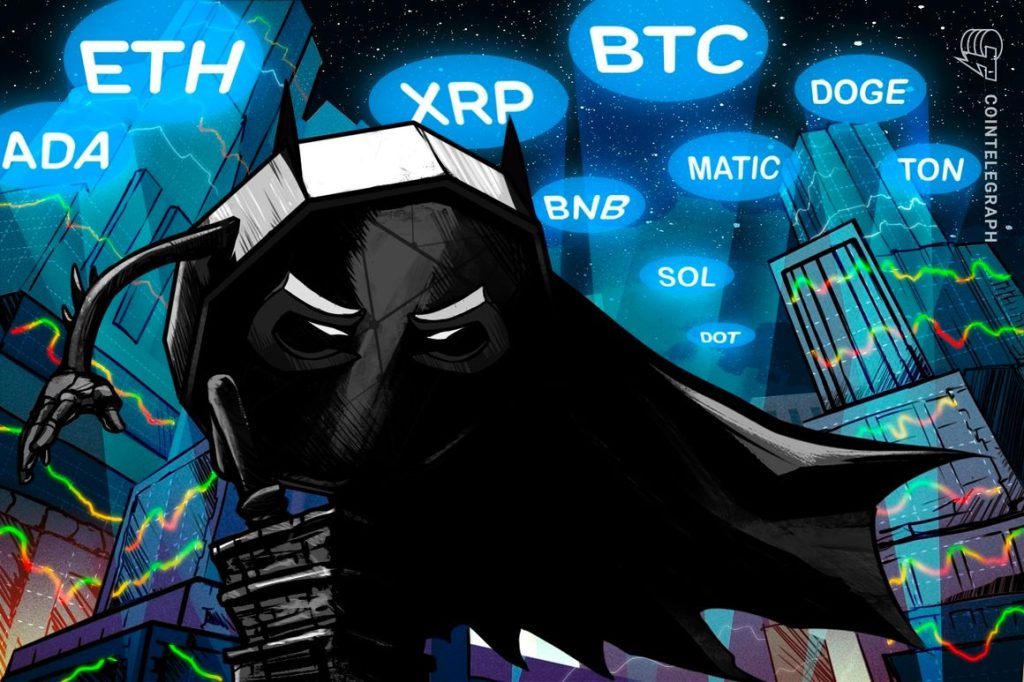BTC, ETH, BNB, XRP, ADA, DOGE, SOL, TON, DOT, MATIC

Bitcoin led the cryptocurrency markets higher on Aug. 29 following Grayscale’s victory in the lawsuit against the United States Securities and Exchange Commission. However, the rally could not be sustained, as analysts cautioned that the victory did not guarantee the approval of a spot Bitcoin (BTC) exchange-traded fund.
Still, the victory may prove to be bullish for Grayscale. Glassnode analysts said in an X (formerly Twitter) post on Aug. 30 that the Grayscale Bitcoin Trust (GBTC) could return to a premium next year. It is important to note that GBTC has been trading at a discount to the spot Bitcoin price for the past two and a half years.
In the short term, even though the S&P 500 Index is on a path of recovery and the U.S. Dollar Index has turned down in the near term, the crypto markets are not able to sustain the higher levels. This shows that traders have maintained their focus on crypto-specific news.
Could bulls defend the support levels in Bitcoin and altcoins? Will that lead to a stronger recovery soon? Let’s study the charts of the top 10 cryptocurrencies to find out.
Bitcoin price analysis
Bitcoin’s range resolved to the upside with a sharp breakout on Aug. 29. This move indicates that the price is likely to oscillate inside the large range between $24,800 and $31,000 for a few days.

The 20-day exponential moving average (EMA) of $27,168 is flattening out and the relative strength index (RSI) is just below the midpoint, indicating that the selling pressure is reducing.
Buyers will try to defend the breakout level of $26,833. If they succeed, it will signal that the bulls have flipped the level into support. The BTC/USDT pair may first rise to the 50-day simple moving average (SMA) of $28,689 and thereafter attempt a rally to $31,000.
If bears want to trap the aggressive bulls, they will have to pull the price below $26,833. If they do that, it will indicate that the bears are selling on every recovery attempt. The pair could then retest the strong support at $24,800.
Ether price analysis
Ether (ETH) once again rebounded off the crucial support at $1,626 on Aug. 28, indicating that the bulls are buying the dips.

The momentum picked up on Aug. 29, and the bulls propelled the price above the 20-day EMA ($1,716). This suggests that the ETH/USDT pair could swing between $1,626 and $1,816 for some more time.
The price turned back below the 20-day EMA on Aug. 30, signaling that bears have not yet given up. If the price maintains below the 20-day EMA, the pair could tumble to $1,626. Contrarily, if the price turns up and climbs back above the 20-day EMA, the pair may reach the overhead resistance at $1,816.
BNB price analysis
After tight range trading near $220 for a few days, BNB (BNB) surged higher on Aug. 29. The relief rally is facing resistance at the 50-day SMA ($235) as seen from the long wick on the day’s candlestick.

The 20-day EMA ($224) is flattening out and the RSI is just below the midpoint, indicating that the downward selling pressure is reducing. If the price turns up from the current level, the BNB/USDT pair could rally to the resistance line. This level may again attract aggressive selling by the bears.
On the downside, if the price slides below $220, it will indicate that the bears remain in control. The pair could then slump to the Aug. 22 intraday low of $203.
XRP price analysis
XRP (XRP) has been trading between $0.50 and $0.56 for the past few days. This suggests that the bulls are buying near the support and the bears are selling close to the resistance.

The downsloping 20-day EMA ($0.55) and the RSI in the negative territory indicate that the bears have the upper hand. Sellers will try to sink the price below the strong support at $0.50. If they manage to do that, the XRP/USDT pair may plummet to $0.41.
Alternatively, if the price rebounds off $0.50, the pair may extend its stay inside the tight range for some more time. Buyers will have to shove and sustain the price above $0.56 to signal the start of a sustained recovery. The pair may then rise to the 50-day SMA ($0.64).
Cardano price analysis
The bulls pushed Cardano (ADA) above $0.28 on Aug. 29, but they could not sustain the higher levels. That kept the price below the resistance at $0.28.

This shows that the price remains stuck inside the range between $0.24 and $0.28. The next support is at the uptrend line. If the price rebounds off this level with strength, it will suggest that every minor dip is being purchased. That will enhance the prospects of a rally above $0.28. Above this level, the ADA/USDT pair could soar to $0.32.
Instead, if the price dives below the uptrend line, it will signal that the bears are trying to make a comeback. The pair could then skid to the vital support at $0.24.
Dogecoin price analysis
Dogecoin (DOGE) reached the 20-day EMA ($0.07) on Aug. 29, but the bulls are struggling to sustain the price above it.

If the price turns down sharply from the current level, it will suggest that bears are selling on rallies. The DOGE/USDT pair may then consolidate between the 20-day EMA and the support at $0.06.
Alternatively, if the pair does not give up much ground from the current level, it will suggest that the bulls are maintaining their buying pressure. That could open the gates for a potential rally to $0.08.
Solana price analysis
Solana’s (SOL) recovery hit a roadblock at the 20-day EMA ($21.77) on Aug. 29, indicating that the sentiment remains negative and traders are selling on rallies.

The bears will once again try to tug the price to $19.35. If this level cracks, the SOL/USDT pair could start a downward move to $18 and then to $16.
The bulls are likely to have other plans. They will try to build upon the recovery by pushing the price above the overhead resistance at $22.30. If they can pull it off, the pair may rise to the 50-day SMA ($23.59). If the price turns down from this level, the pair may remain range-bound between the 50-day SMA and $19.35 for some time.
Related: Why is Dogecoin price up today?
Toncoin price analysis
Toncoin (TON) soared above the neckline of the inverse head-and-shoulders pattern at $1.53 on Aug. 29. This signals a potential trend change.

Typically, after a breakout, the price turns down and retests the breakout level. If the price bounces off $1.53, it will suggest that the bulls have flipped the level into support. That could start an up move toward the pattern target of $1.91. If this resistance is scaled, the TON/USDT pair could reach $2.07.
If the bears want to prevent the rally, they will have to quickly sink the price back below $1.53. Such a move could trap the aggressive bulls, resulting in a long liquidation. The pair may then slump to $1.25.
Polkadot price analysis
Polkadot (DOT) broke and closed above the 20-day EMA ($4.64) on Aug. 29, but the long wick on the candlestick shows selling at higher levels.

The bears pulled the price back below the 20-day EMA on Aug. 30. This indicates that the bears have not given up and are viewing the recoveries as a selling opportunity. The flattening 20-day EMA and the RSI in the negative territory signal possible range-bound action in the near term.
If the price breaks below $4.50, the DOT/USDT pair may swing between the 20-day EMA and $4.22 for some time. On the other hand, a break and close above the 20-day EMA could propel the pair to the overhead resistance at $5.
Polygon price analysis
Polygon (MATIC) is facing stiff resistance in the zone between $0.60 and $0.65 as seen from the long wick on the Aug. 29 candlestick.

The price turned down on Aug. 30, suggesting that the MATIC/USDT pair could consolidate in a large range between $0.51 and $0.65 for a while. The price action inside the range is likely to remain random and volatile.
If bears want to seize control, they will have to drag the price below $0.51. That could resume the downtrend with the next support at $0.45. On the upside, a break and close above the 50-day SMA ($0.67) could signal that the bulls are in the driver’s seat.
This article does not contain investment advice or recommendations. Every investment and trading move involves risk, and readers should conduct their own research when making a decision.














